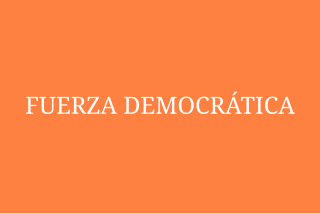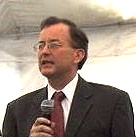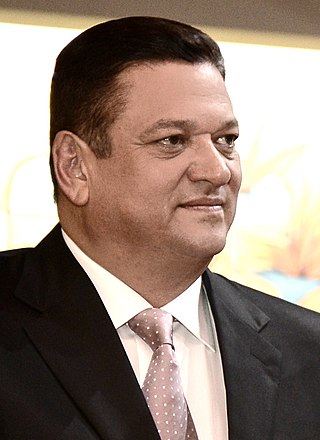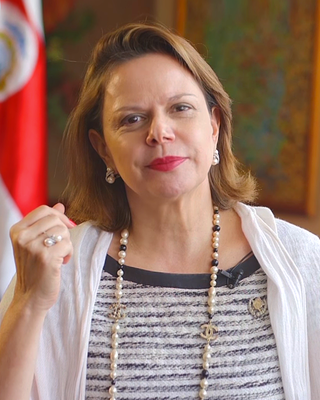
The politics of Costa Rica take place in a framework of a presidential, representative democratic republic, with a multi-party system. Executive power is exercised by the president and their cabinet, and the President of Costa Rica is both the head of state and head of government. Legislative power is vested in the Legislative Assembly. The president and 57 Legislative Assembly deputies are elected for four-year terms. The judiciary operates independently from the executive and the legislature, but is involved in the political process. Costa Rica has a strong system of constitutional checks and balances. Voting is compulsory de jure, but this is not enforced.

The National Liberation Party, nicknamed the verdiblancos, is a political party in Costa Rica. The party is a member of the Socialist International. Social-democratic by statute, the party has a few internal factions, including liberals, Third Way supporters, centrists, and social conservatives.

The Citizens' Action Party is a political party in Costa Rica.

The Social Christian Unity Party is a centre-right political party in Costa Rica.

Democratic Force nicknamed “El Naranjazo” was a political party in Costa Rica.

General elections were held in Costa Rica on 5 February 2006. In the presidential election, Óscar Arias of the National Liberation Party, a former president and Nobel Peace Laureate, was victorious over Ottón Solís of the Citizens' Action Party and twelve other minor-party candidates. Although Arias was expected to win by a wide margin, the actual polling reports were unexpectedly close. However, early results showed the contest to be closer than it actually was. The preliminary official report, after 88.45% of the vote counted, showed the result for President of the Republic almost tied between Arias with 40.51% of the vote and Ottón Solís with 40.29%. Given the small difference of only 3250 votes, the Superior Electoral Tribunal announced that a manual count of all the votes would start immediately and no official winner would be announced until that process was completed, approximately two weeks after the election.

Ottón Solís Fallas is a Costa Rican politician. He graduated with a Bachelor of Economics from the University of Costa Rica in 1976 and gained a master's degree in economics from the University of Manchester in 1978. He is currently serving his second term as congressman. He was a founding member of the Citizens' Action Party and ran as its three-time presidential candidate. As an academic, he has taught at several universities in the United States and Costa Rica.

Johnny Francisco Araya Monge is a Costa Rican politician. He was the mayor of the country's capital San José from 1998 to 2013 and again since 2016. He was also the co-president of the United Cities and Local Governments (UCLG) from 2010 to 2013. He is a member of the National Liberation Party (PLN) and was a presidential candidate in the 2014 election.

General elections were held in Costa Rica on 7 February 2010. The ruling party before the election, the center-left National Liberation Party, put forward former Vice-President Laura Chinchilla as its presidential candidate, while the libertarian, Movimiento Libertario nominated former legislator Otto Guevara. Opinion polls before voting started consistently put Chinchilla as the front-runner, a trend confirmed in the election-night count, which showed her garnering 46.76% of the vote.
Events in the year 2014 in Costa Rica.

General elections were held in Costa Rica on Sunday, 2 February 2014 to elect a new president, two vice presidents, and 57 Legislative Assembly lawmakers. In accordance with Article 132 of the constitution, incumbent President Laura Chinchilla Miranda was ineligible to run for a second consecutive term.

Luis Guillermo Solís Rivera is a Costa Rican politician and educator who was the 47th President of Costa Rica from 2014 to 2018. He is a member of the Citizens' Action Party (PAC).

Ana Helena Chacón Echeverría is a Costa Rica politician, who served as the nation's 2nd Vice President, under Luis Guillermo Solís 2014–2018, and as Ambassador in Spain, under Carlos Alvarado. Her political career is dedicated to issues of feminism, human rights, and public health policy. Previously a cabinet minister and deputy, Chacón has also served on numerous committees and conferences on the national and international level.

Municipal elections were held in Costa Rica on 7 February 2016, in order to elect the mayors of the 81 cantons of the country plus a proportional number of aldermen (regidores) in each of the canton's municipal councils, a syndic for every district and members of the District Councils and a total of 8 Intendants for districts and islands located too far away from the administrative center.

A primary election was held among the members of Costa Rica's then ruling National Liberation Party (PLN) on June 7, 2009 in order to choose the PLN's nominee for presidency in the 2010 general election. The two main candidates for the nomination were then vice-president Laura Chinchilla and San José Mayor Johnny Araya. Former security minister Fernando Berrocal also ran a basically testimonial candidacy. PLN's main rival party, PAC, ran its own convention a month before.

PAC’s second presidential primary was held on July 21, 2013 in order to elect the party’s presidential nominee for the 2014 Costa Rican general election. Unlike the previous election, this was an open primary and every citizen was able to vote as far as pledge written membership to the party before casting the vote.

Costa Rica's National Liberation Party presidential primary was a primary election programmed for April 2, 2017 in order to choose the party's presidential nominee for the 2018 Costa Rican general election. PLN was then the main opposition party to Luis Guillermo Solís' government.

General elections were held in Costa Rica in 2018 to elect both the President and Legislative Assembly. The first round of the presidential election was held on 4 February 2018, with the two highest-ranked candidates being Christian singer and Congressman Fabricio Alvarado Muñoz from the conservative National Restoration Party and writer and former Minister Carlos Alvarado Quesada from the progressive Citizens' Action Party, gaining 24% and 21% of the votes respectively. As no candidate received more than 40% of the first round vote, a second round run-off election was held on 1 April 2018 and was won by Carlos Alvarado Quesada, with a landslide victory of 60.6% of the vote.

Figuerism or Figuerismo is a political and ideological movement in Costa Rica of social democracy and democratic socialism initiated by José Figueres Ferrer, who exercised the presidency of Costa Rica on three occasions; as de facto ruler after the Costa Rican revolution between 1948 and 1949, and then as democratically elected president twice: 1953–1958 and 1970–1974. Several Costa Rican political parties proclaim themselves as continuators of figuerism and as their most faithful representatives, among them the National Liberation Party, Citizens' Action Party and the Patriotic Alliance, all of whom pay homage to the figure of José Figueres and have personalities in their ranks close to the former president Figueres and of figuerist extraction.

General elections were held in Costa Rica on 6 February 2022, to elect the president, two vice-presidents, and all 57 deputies of the Legislative Assembly. As none of the presidential nominees obtained at least 40% of the votes, a runoff was held on 3 April 2022, between the top two candidates, José María Figueres and Rodrigo Chaves Robles.

















